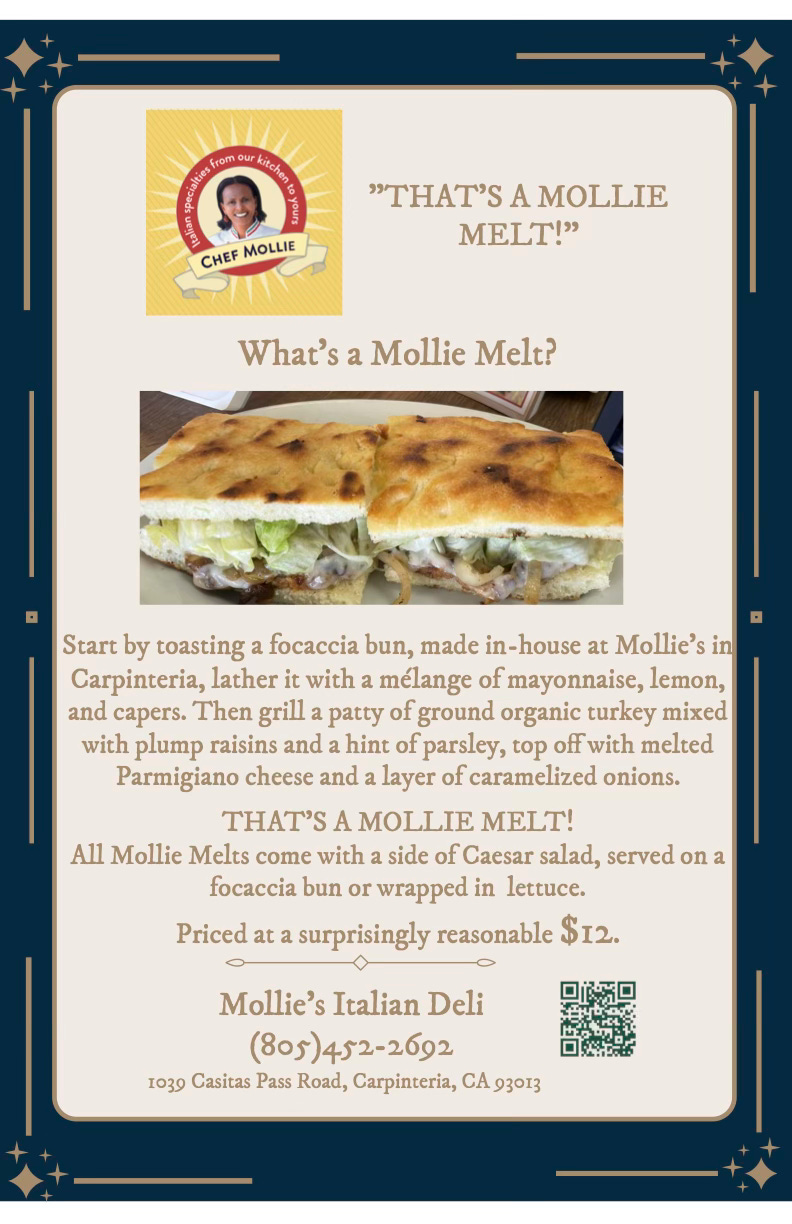There is Nothing Artificial About Grok
I am excited to share my enthusiasm for the online informational platform Grok (a term taken from Robert A. Heinlein's “Stranger in a Strange Land,” which Google explains, “Heinlein invented for his fictional Martian language, drawing inspiration from the idea of ‘drinking,’ or absorbing something deeply.”).
My hope is to inspire readers of SB Current to test it out.
A month ago, Elon Musk, while being interviewed by Joe Rogan about Artificial Intelligence (AI), said that if people would just put their most recent medical blood test results into Grok they would be amazed.
So, I did.
There are several levels of access to Grok, and it is evolving all the time, but you can set up a free account and start asking it questions right away. For those of us who have embraced “Googling” to back up our know-it-all statements, Grok is light years ahead.
I’m not one who is paranoid about medical secrecy. I suppose for some that would be a factor. In which case just don’t reveal anything you want to remain a secret, just ask hypothetical questions. Of course, the more details you give about your personal medical situation the better analysis you’ll get.
The one part of Medical Science I still retain respect for are the bloodwork tests and their ability to monitor systemic health. A year ago, I got “scared straight” by my doctor evaluating test trends and telling me things were not going in the right direction. He explained what I needed to do or else I’d be taking drugs to remedy some situations that were developing. At this point I take no medicines and have a horror of doing so, so I determined to make “lifestyle” changes.
And it is working.
If I imagine most doctors, who have a God Complex endemic to their profession, I can easily see them rejecting Grok data presentations. Doubtless their lives are filled with patients who self-diagnose ailments and then find the cure in television or magazine advertisements. Me, I’m the sort that turns the ad page over, sees the two pages of “side effects” listed, and rushes past. I think of all the potential evils as “effects” and unpredictable.
China’s Grip on Active Pharmaceutical Ingredients
So, I will do anything I can to remain that rarest of birds, a 70 year old who is not on any maintenance drug. I am committed to the idea that since 85% of the prescription drugs taken in America come from China, I simply refuse to be dependent on anything they might cease providing.
I have a horror prediction that if China – for any reason – stops supplying the drug pipeline, we will see a full tilt Zombie Apocalypse as the millions of people who are hooked on maintenance drugs will be abruptly deprived of them.
Just so I don’t over-exaggerate, I asked Grok :
“What percentage of Americans take regular prescription drugs that rely on the Chinese supply pipeline?”
The answer: “A conservative estimate would suggest 30-50% of Americans use drugs with some Chinese supply chain dependency, especially for generics like blood pressure meds, antibiotics, or painkillers.“
Grok went on to educate me about Active Pharmaceutical Ingredients (APIs), to make clear that India sources 80% of its APIs from China, and “About 90% of U.S. prescriptions are for generic drugs, and a significant portion of these rely on APIs or key starting materials from China. Estimates suggest 80% of APIs for U.S. drugs come from overseas, with China and India as major suppliers.”
So, as I suspected, Grok clarifies: “The real issue is the concentration risk—China’s grip on certain critical components could disrupt supply if geopolitical tensions flare.” And anyone whose body is addicted to a drug could be in big trouble.
Grok As a Trusted Second Opinion
I have a friend who is an endocrinologist in Kentucky, and he now sees numerous school-age children as patients who have developed Type 2 diabetes. This is previously unheard of early onset and is the result of mothers who put Mountain Dew in the baby’s bottle instead of milk. The baby’s pancreas can’t handle the constant sugar spiking up and down and crashes.
That doctor uses a medical resource called Clinical Key AI. It scans through the published literature and comes up with citations and results pertinent to the inquiry. He has also used Grok to prepare communications with his patients, to explain conditions thoroughly in “layman’s language.”
When I asked Grok about a dermatology issue I am having, the result was two pages of educational diagnosis and treatment options. None of it disagreed with what my dermatologist at Sansum had told me, but it reinforced his advice with citations and sensible next steps. Thinking that doctor would be interested to see the details I printed it out and posted it to him. When I went back for a check-up, he was completely enthusiastic about it, and asked my permission to share it with colleagues. He said he agreed with it, and that for him to have prepared something that involved for a patient would take 45 minutes, whereas Grok can do it in one minute and then the doctor just must scan the result for a minute or two to be sure he agrees with it all. Many doctors are pressured to have minimal time for each patient, so they see this as a game-enhancer.
But then, when I went to my GP at the UCLA clinic, he said he is forbidden to use Clinical AI. I encouraged him to sneak a look at Grok at home, but I wondered: what possible benefit would there be for a gigantic medical system to deny its practitioners the ability to use any diagnostic tool?
Which drives home the point that when it comes to anything medical, we all need to be our own best advocate.
So, I ask Grok: “What percentage of deaths in the United States are attributed to medical malpractice or error?” it sensibly replied, “Estimates on deaths in the United States attributed to medical malpractice or error vary widely due to differences in methodology, data sources, and definitions of "medical error." Then, citing 25 different web pages’ studies it estimates the total is 10-15%.
That’s enough to send me back to Grok whenever I have a medical question, and to look to it as a valuable resource and Second Opinion to evaluate anything I am being told.
I’ve Seen The Future and it Groks
And lest you think Grok is only useful for medical data, I asked it about my business. I wanted to know what I could do to bring more clients to me for my specialty of Celtic tattooing. In the snap of a finger, it scanned all 100+ pages in both my websites and came up with a 12-page plan for Search Engine Optimization (SEO), to enhance the number of people who find my sites in a web search. On the last page, it made the obvious point that I must be feeling overwhelmed.
Ya think?
And so, it said “Let’s break it down into steps: In the first week do this, and then when you have finished, make the second step your goal.” Thus, it prioritized for me the process so that I could go forward at my own pace.
It is becoming a habit for me now, when I assert something in an argument that might in fact be exaggeration, to turn to Grok for a reality check. Long gone is the time when we might have turned to Snopes to check veracity, but that was before it revealed its bias. And Google has a censorship system in place to rank which pages come up on top of the search.
Grok is the future, whether you use a simple query to Grok 3, or ask it for DeepSearch, or Think. Every day it is adding to its database, loading in more information, and it is there for the asking.
I suggest you try it for yourself.






Good for you Pat! The medical profession has taken a major hit in the trust and credibility department lately. Most recently, the fiasco of the COVID mismanagement and the vaccine response was huge. “Trust the experts”, and believing that Dr. Fauci was science personified now seems to many like a dubious idea. I used to look at my watch while patients in the exam room started to tell me all the questions or suggestions their Google search produced. In the last month, I have made AI my research assistant and handout generator. When a 70 year old lady asks me why she has to keep getting painful mammograms, my 45 years of medical experience generates an answer which I offer her. She still looks skeptical. Then, to emphasize the point, I do a Grok search as she sits there. It always turns out fascinating information and generally validates my advice. I copy the Grok answer and text it to her phone. Sometimes I learn something new, which I find fascinating.
The point is that embracing Grok or some AI is interesting and informative. I use it every day. It even gave me a logical basis for getting an estimate on whether the Dodgers had a chance to win the World Series this season.
Yes, I use it often. What is important is that you properly pose the question with well formed parameters. The better the instructions within the question, the better result.